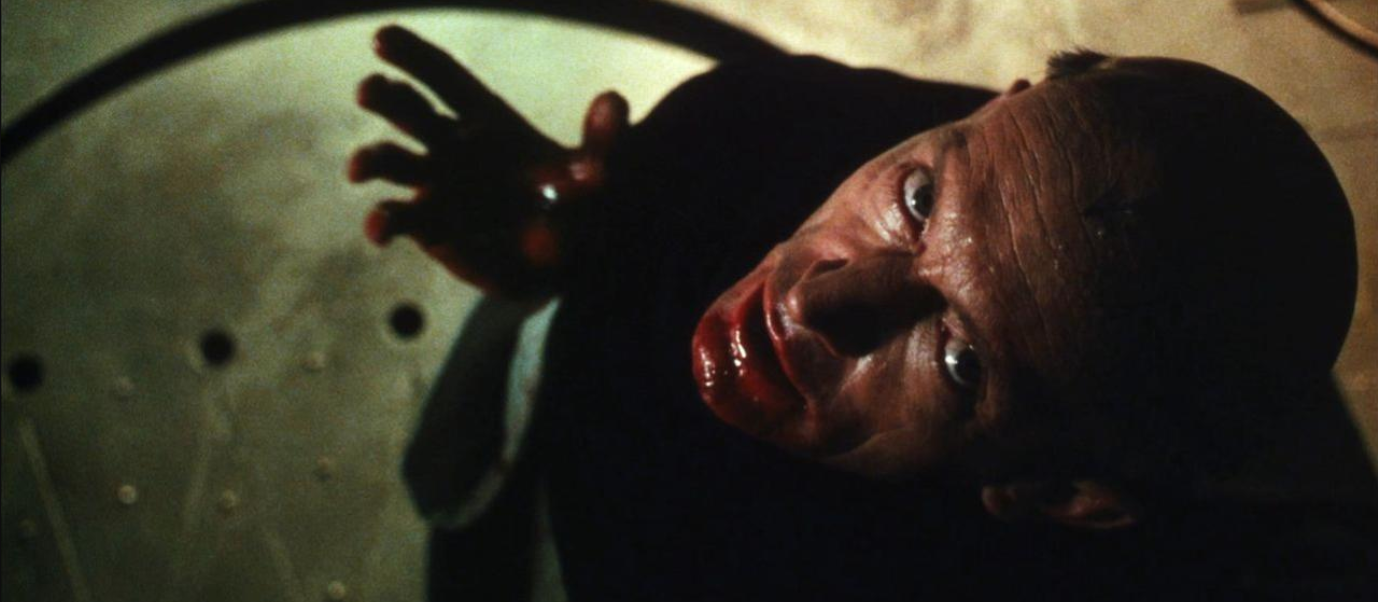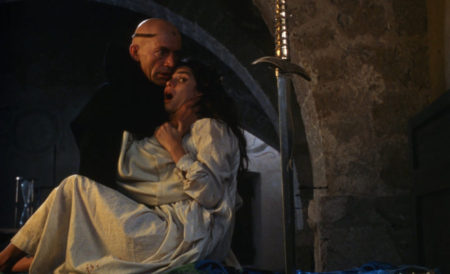

“Man’s time on earth is brief. But his soul lives on in heaven… or in the pit of hell.”
Though fascinating on the page, the works of Edgar Allan Poe have proven difficult to adapt to the cinematic medium. That’s because they’re typically fragmentary excursions that present a frightening climax laden with mental torment—engaging, to be certain, but not the sort of tale one associates with a feature length film, marked as they are by narrow plots, flimsy characterizations, and internal agony. That Poe’s stories often fail as films is no fault of the author, who died before the first moving picture was made, let alone an adaptation of one of his works. But it is certainly the case that the best of those films are the ones that iterate on the tales, that create new backstories apart from the source material and refuse to limit themselves to the written work. Chief among these are the string of Poe adaptations in the 1960s from B movie maven Roger Corman. And it would stand to reason that Stuart Gordon used Corman’s The Pit and the Pendulum as an inspiration, if not exactly a template, for his own adaptation thirty years later.
Retaining the core scenario of a man being tortured at the hands of a the Spanish Inquisition, Gordon’s film, written by Dennis Paoli, fleshes out the story by adding new characters and narrative arcs and incorporating elements from Poe’s “The Cask of Amontillado”. It stars a committed Lance Henriksen as Grand Inquisitor Torquemada, a ruthless man whose true colors are on display in the very first scene when he has a corpse exhumed and tortured—the body flayed into pieces, the skull ground into dust—when the deceased is retroactively deemed a heretic. Clearly lacking both compassion and sanity, Torquemada finds himself enraptured a short time later by the beautiful, innocent Maria (Rona De Ricci), who has intervened and begged for mercy during an auto-da-fé where a young boy and his mother are being tortured to death for the sins of their ancestors.

Confused by his lustful feelings, deducing that his attraction is the result of demonic magic, Torquemada declares Maria a witch and has her thrown into a dungeon where she is roughly handled by zealous sadists who tear off her clothing to “inspect” for the devil’s mark. Though he submits himself to mortification of the flesh at the hands of a henchman, Torquemada cannot shake the spell cast on him by Maria’s purity. As his mental faculties deteriorate, his behavior becomes increasingly erratic, escalating to an unhinged ferocity when Maria is befriended by a real witch (Frances Bay) and her husband Antonio (Jonathan Fuller) attempts to break her out of prison. When Antonio is captured and put under the swinging blade of the pendulum, Maria’s previously staunch denials turn to confessions in the hope that she might save her husband’s life.
How can they confess if they don’t have tongues?

Fleshed out by a collection of excellent character actors and Gordon regulars—Jeffrey Combs, Mark Margolis, Tom Towles, Oliver Reed, Carolyn Purdy-Gordon, William Norris, Stephen Lee—The Pit and The Pendulum strikes a pleasant balance between a committed period piece and a work of intentional camp. Even accounting for the limited budget, there’s an obvious care given to the costumes, set design, gore effects, plotting, and camerawork. But the whole production is shot through with Gordon’s excessive tendencies, exemplified by Torquemada’s weird fetishes like taking pleasure in his own flagellation, fingering the stigmata in the hands of one of his underlings, and dressing up his prisoners as the Virgin Mary. Additional darkly comedic and schlocky touches include the witch’s consumption of gunpowder before she is burned at the stake (leading to an explosion of bone shrapnel ripping through the onlooking crowd), Oliver Reed’s drunken Cardinal, Jeffrey Combs’ deadpan, bespectacled bureaucrat, and some excessive full frontal nudity. None of this would work, though, without Henriksen’s commitment to an admittedly complex role and de Ricci’s turn as the petrified Maria.1
What shakes out of this mad brew is a tonally jagged horror film that straddles the line between genuine tension, terror, and unseemliness, and wholesale exploitation of its period trappings and Catholicism clichés for dark amusement. Not bad for a direct-to-video effort from Full Moon Features. Not bad at all.
1. After The Pit and the Pendulum, Rona de Ricci disappeared from the film industry, and was out of the public eye until 2020 when she released a memoir detailing her struggles with economic hardship and familial abuse and then promptly committed suicide. It’s a truly heartbreaking story.